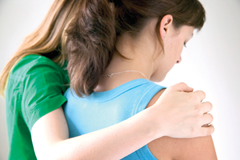Supporting young carers
 Children as young as eight are caring for a parent or family member in Northern Ireland. Young Carers NI’s Julia McKeown tells Emma Blee about the problems they face and the support available.
Children as young as eight are caring for a parent or family member in Northern Ireland. Young Carers NI’s Julia McKeown tells Emma Blee about the problems they face and the support available.
“You would be amazed at how many very responsible tasks that very young children have to do. You would have children of 12 that run a whole household and that wouldn’t be unusual,” remarks project manager Julia McKeown.
The organisation provides support for around 600-700 young people at any one time who look after or care for a parent or relative who is ill, has a disability, a mental health problem or who misuse drugs or alcohol.
Their duties could include anything from helping with domestic chores such as cooking and cleaning to personal care like bathing and dressing. Providing emotional support and looking after bills are also common.
This can have a negative effect on education. Time-keeping, attendance and poor concentration can be problems. “It’s hard to focus on classes if you’re worrying about your parent at home and if they are going to take an overdose when you are out,” explains McKeown.
Children often turn down social invites because of their responsibilities and life chances such as going to university can also be affected. She says: “Emotional ties to family members might make it seem like a really selfish thing to do to move away.”
Being a young carer can also harm a young person’s physical and mental health. Many tasks include heavy lifting and carrying and manual labour and this can damage a growing skeleton.
She adds: “Stress and adult worries can be difficult especially if they are living in a household where there is a high instance of mental health problems.”
Action for Children and Barnardos were commissioned by DHSSPS in 2007 to develop a regional service for young carers. They set up Young Carers NI in June 2008 and the service is now delivered in all areas.
When a young person contacts the organisation, they are allocated a key worker who carries out an assessment of their particular needs. A package of support is then developed and this will be different for each child.
Staff and volunteers from Young Carers NI organise day trips and activities such as go-karting, abseiling, caving and jewellery-making. This gives young people “a break from caring and a chance to meet other young people who understand what it’s like to look after someone also,” comments McKeown.
Members of the project also have the opportunity to learn new skills like first aid, digital photography, film-making, cookery, dance and drama.
She says that although everyone is different, each child that uses the service is given support: “For some young people it might be respite and the chance to have some enjoyment. A lot of our young people don’t have the opportunity to do those things.”
The organisation also brings young carers together to talk about their experiences and intense one-to-one support is available for anyone who needs it. Problems such as anger management and the effects of bullying are dealt with through this type of counselling.
McKeown concludes: “It can be difficult enough being a teenager on its own but having to cope with adult worries on top of that is a big pressure, and some young carers do miss out on their childhood.”





